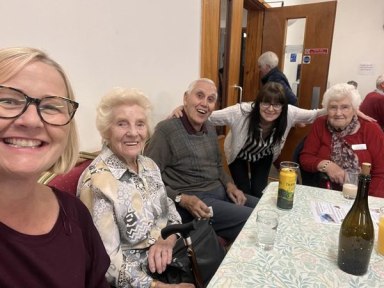Early Signs of Dementia


What Smells, Sounds, and Daily Experiences Can Reveal
Subtle Changes in Smells, Sounds and Daily Life at Home and in Care Homes
Subtle changes in smell, sleep, humour, or attention can provide some of the earliest clues to dementia. Recognising these signs in everyday life, whether at home or elsewhere, can help families seek support sooner and improve wellbeing.
Early signs to watch for:
Loss of smell or difficulty recognising familiar scents Changes in sleep patterns Struggling to understand jokes or sarcasm Frequent zoning out or loss of focus
Smell Loss and Dementia: An Early Clue It may seem unusual, but losing the sense of smell is sometimes one of the earliest signs of dementia. Studies show that people with Alzheimer’s often struggle to recognise scents such as mint, lemon or peanut butter. Although our sense of smell naturally weakens with age, researchers continue to find evidence that this change can be an early warning worth paying attention to.
Fact: Research suggests that up to 90% of people with Alzheimer’s experience changes in their sense of smell before other symptoms appear.
What to do: If you notice your loved one struggling with everyday scents, it may help to mention this to a GP or memory clinic. In our homes, care teams pay attention to these small changes and share observations with families so concerns can be addressed early.
Why Sleep Matters for Dementia Risk Sleep is not only about recharging. During rest, the brain clears harmful proteins linked to Alzheimer’s. Poor sleep, on the other hand, may increase the risk. That is why care homes create calming environments and bedtime routines that support deeper, healthier rest.
Fact: Chronic insomnia can raise dementia risk by up to 40%
What to do: If poor sleep becomes a regular issue at home, try keeping a consistent bedtime, avoiding caffeine in the evening, and creating a calm environment. Families may also benefit from respite care, where professional teams can provide rest and reassurance for both residents and carers. For further advice on practical strategies to encourage better rest, read our article on Dementia and sleep patterns here…
When Jokes Stop Making Sense A sharp sense of humour says a lot about a person. But when sarcasm or jokes suddenly stop making sense, it can be a sign that dementia is affecting the way the brain processes meaning and tone. A once-cheeky comment that once brought out a smile might suddenly be taken literally. This small but striking change is another early sign of dementia.
Fact: Changes in humour can appear years before a formal dementia diagnosis.
What to do: If you notice your loved one struggling with humour or conversation, speak with a healthcare professional. In our care homes, staff use familiar activities, music, and storytelling to keep communication engaging and to reduce frustration.
Daydreaming or Dementia Warning Sign? We all drift into daydreams. However, frequent “zoning out”, which are long spells of staring into space without focus, may signal that the brain is struggling to process information. These moments are not ordinary daydreams. They are now recognised as another early warning sign in people with Alzheimer’s.
Fact: Mild cognitive impairment, which can precede dementia, often presents with attentional lapse.
What to do: Keep track of how often these moments happen and share your notes with a GP. Our care teams often record these changes as part of daily observations, which helps doctors provide more accurate assessments.
Living through the senses At their best, care homes celebrate the senses. The warmth of fresh sheets, the sound of laughter from a game of bingo, the smell of dinner cooking, or the comfort of holding a hand all contribute to wellbeing.
While some people imagine creaky corridors and a distinctive smell, a well-run home is filled with the scent of Sunday lunch, fresh flowers on the table, or coffee that always tastes better when someone else makes it. Modern care homes nurture the senses and support residents’ quality of life, noticing subtle changes in smell, sleep, humour, or focus that families may observe at home.
Caring for people is not only about meeting medical needs. It is about creating a life full of flavour, sound, and warmth. Recognising early signs of dementia can make a meaningful difference. Paying attention to these changes allows families to seek support sooner and improve wellbeing.
If you would like to learn more about how our care homes support people living with dementia, contact us today.
click here for more details or to contact Westgate Healthcare Ltd
Latest Care Provider & Regulatory News
 24-Sep-28
Night out
24-Sep-28
Night out
 19-Sep-25
Unique Music Therapy Session
19-Sep-25
Unique Music Therapy Session
 19-Sep-25
Brampton Manor Home Manager Wins at Suffolk Care Awards 2025
19-Sep-25
Brampton Manor Home Manager Wins at Suffolk Care Awards 2025
 19-Sep-25
Professional Care Workers' Week
19-Sep-25
Professional Care Workers' Week
 19-Sep-25
Riverside Dining in the South Downs – A Day to Remember
19-Sep-25
Riverside Dining in the South Downs – A Day to Remember